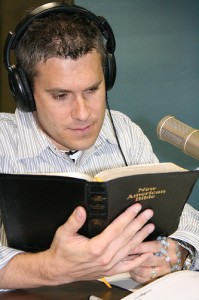The Sunday, Sunday, Sunday Podcast is a reflection on the upcoming Sunday Mass readings presented by LifeTeen.com and hosted by Mark Hart.
Sunday Readings from the USCCB
Reading 1 Â IS 63:16B-17, 19B; 64:2-7
Responsorial Psalm  PS 80:2-3, 15-16, 18-19
Reading 2 Â 1 COR 1:3-9
Gospel  MK 13:33-37
Jesus said to his disciples:
“Be watchful! Be alert!
You do not know when the time will come.
It is like a man traveling abroad.
He leaves home and places his servants in charge,
each with his own work,
and orders the gatekeeper to be on the watch.
Watch, therefore;
you do not know when the Lord of the house is coming,
whether in the evening, or at midnight,
or at cockcrow, or in the morning.
May he not come suddenly and find you sleeping.
What I say to you, I say to all: ‘Watch!’â€
Lectionary for Mass for Use in the Dioceses of the United States, second typical edition, Copyright © 2001, 1998, 1997, 1986, 1970 Confraternity of Christian Doctrine;
Tags: Advent Cycle B, gospel of mark, lifeteen
This entry was posted on Sunday, November 30th, 2014 at 9:20 am
You can follow any responses to this entry through the RSS 2.0 feed.
The Gospel of Mark…it’s time, context, importance and 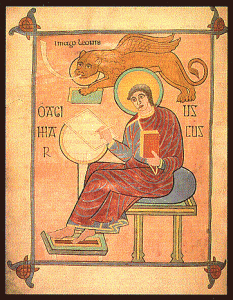 relevance for today. Who was Mark? Who were the people he was addressing? What makes it unique?
relevance for today. Who was Mark? Who were the people he was addressing? What makes it unique?
Mark Hart is an author[powerpress], speaker, director and teacher, Mark’s work both written and spoken, is known across the country and world. While he serves as the Vice President of LIFE TEEN, he is known to tens of thousands simply as the “Bible Geek ®†Mark passionately echoes the gospel to all he encounters. He is as deep as he is funny, and his love for his wife and daughters is second only to his immense love for Jesus Christ.
Visit Mark at www.lifeteen.com
Tags: gospel of mark, jesus christ, life teen, love, mark hart, work
This entry was posted on Thursday, April 25th, 2013 at 12:01 am
You can follow any responses to this entry through the RSS 2.0 feed.
“This is my beloved Son; listen to him”
[powerpress]
an excerpt from today’s reflection by Don Schwager:
Are you prepared to see God’s glory? God is eager to share his glory with us! We get a glimpse of this when the disciples see Jesus 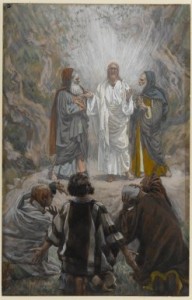 transfigured in glory on the mountain. [See With Jesus on the Mount of Transfiguration] Mark’s account tells us that Jesus’ garments became glistening, intensely white. When Moses met with God on Mount Sinai the skin of his face shone because he had been talking with God (see Exodus 34:29). Paul says that the Israelites could not look at Moses’ face because of its brightness (2 Corinthians 3:7). In this incident Jesus appeared in glory with Moses, the great lawgiver of Israel, and with Elijah, the greatest of the prophets, in the presence of three of his beloved apostles. What is the significance of this mysterious appearance? Jesus went to the mountain knowing full well what awaited him in Jerusalem — his betrayal, rejection and crucifixion. Jesus very likely discussed this momentous decision to go to the cross with Moses and Elijah. God the Father also spoke with Jesus and gave his approval: This is my beloved Son; listen to him. The cloud which overshadowed Jesus and his apostles fulfilled the dream of the Jews that when the Messiah came the cloud of God’s presence would fill the temple again (see Exodus 16:10, 19:9, 33:9; 1 Kings 8:10; 2 Maccabees 2:8). The Lord wants to reveal his glory to all who earnestly seek him with faith.
transfigured in glory on the mountain. [See With Jesus on the Mount of Transfiguration] Mark’s account tells us that Jesus’ garments became glistening, intensely white. When Moses met with God on Mount Sinai the skin of his face shone because he had been talking with God (see Exodus 34:29). Paul says that the Israelites could not look at Moses’ face because of its brightness (2 Corinthians 3:7). In this incident Jesus appeared in glory with Moses, the great lawgiver of Israel, and with Elijah, the greatest of the prophets, in the presence of three of his beloved apostles. What is the significance of this mysterious appearance? Jesus went to the mountain knowing full well what awaited him in Jerusalem — his betrayal, rejection and crucifixion. Jesus very likely discussed this momentous decision to go to the cross with Moses and Elijah. God the Father also spoke with Jesus and gave his approval: This is my beloved Son; listen to him. The cloud which overshadowed Jesus and his apostles fulfilled the dream of the Jews that when the Messiah came the cloud of God’s presence would fill the temple again (see Exodus 16:10, 19:9, 33:9; 1 Kings 8:10; 2 Maccabees 2:8). The Lord wants to reveal his glory to all who earnestly seek him with faith.
“Lord Jesus, keep me always alert and awake to you, to your word, your action, and your daily presence in my life. Let me see your glory.â€
for the full reflection visit : Daily Reading and Meditation
Tags: don schwager, feast of the transfiguration, gospel of mark
This entry was posted on Monday, August 6th, 2012 at 1:27 am
You can follow any responses to this entry through the RSS 2.0 feed.
“Jesus was in the wilderness forty days, tempted by Satan“
[powerpress]
an excerpt from today’s reflection by Don Schwager:
Matthew, Mark, and Luke tell us in their gospel accounts that Jesus was led by the Holy Spirit into the wildnerness. Mark states it most emphatically: “The Spirit immediately drove him out into the wilderness” (Mark 1:12). Why was Jesus compelled to seek solitude for such a lengthy period? Was it simply a test to prepare him for his ministry? Or did Satan want to lure him into a trap?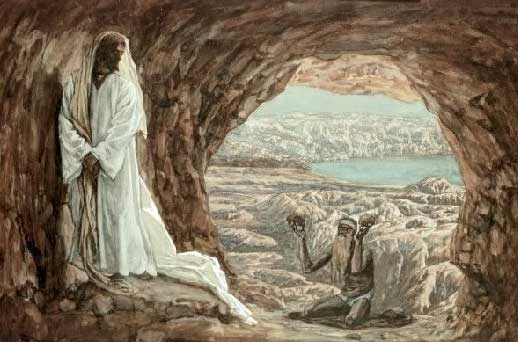 The word tempt in English usually means to entice to sin. The scriptural word here also means test in the sense of proving and purifying someone to see if there are ready for the task at hand. We test pilots to see that they are fit to fly. Likewise God tests his servants to see if they are fit to be used by him. God tested Abraham to prove his faith. The Israelites were sorely tested in Egypt before God delivered them from their enemies. Jesus was no exception to this testing. Satan, in turn, did his best to entice Jesus to chose his own will over the will of his Father. Despite his weakened condition, due to fatigue and lack of food for 40 days, Jesus steadfastly rejected Satan’s sublte and not so subtle temptations. Where did Jesus find his strength to survive the desert’s harsh conditions and the tempter’s seduction? He fed on his Father’s word and found strength in doing his will. Satan will surely tempt us and will try his best to get us to choose our will over God’s will. If he can’t make us renounce our faith or sin mortally, he will then try to get us to make choices that will lead us, little by little, away from what God wants for us.
The word tempt in English usually means to entice to sin. The scriptural word here also means test in the sense of proving and purifying someone to see if there are ready for the task at hand. We test pilots to see that they are fit to fly. Likewise God tests his servants to see if they are fit to be used by him. God tested Abraham to prove his faith. The Israelites were sorely tested in Egypt before God delivered them from their enemies. Jesus was no exception to this testing. Satan, in turn, did his best to entice Jesus to chose his own will over the will of his Father. Despite his weakened condition, due to fatigue and lack of food for 40 days, Jesus steadfastly rejected Satan’s sublte and not so subtle temptations. Where did Jesus find his strength to survive the desert’s harsh conditions and the tempter’s seduction? He fed on his Father’s word and found strength in doing his will. Satan will surely tempt us and will try his best to get us to choose our will over God’s will. If he can’t make us renounce our faith or sin mortally, he will then try to get us to make choices that will lead us, little by little, away from what God wants for us.
How do we enter the kingdom of God? In announcing the good news, Jesus gave two explicit things each of us must do to in order to receive the kingdom of God: repent and believe. When we submit to Christ’s rule in our lives and believe the gospel message, the Lord Jesus gives us the grace and power of Holy Spirit to live a new way of life as citizens of God’s kingdom. Jesus gives us grace and conviction to renounce sin and Satan, the father of lies (John 8:44) and the ruler of this present world (John 12:31). That is why repentance is the first step. Repentance means to change – to change my way of thinking, my attitudes and disposition, and the choices I determine for my life, so that Christ can be the Lord and Master of my heart rather than sin, greed, and selfishness. If we are only sorry for the consequences of our sins and bad choices, we will very likely keep repeating them. True repentance requires a contrite heart (Psalm 51:17) – a true sorrow for sin and a firm resolution to avoid it in the future. The Lord Jesus gives us grace to see sin for what it really is – a rejection of his love and wisdom for our lives and a refusal to do what is good and in accord with his will. His grace brings pardon, healing, and help for turning away from everything that would keep us from his love and truth. To believe is to take Jesus at his word and to recognize that God loved us so much that he sent his only begotten Son to free us from bondage to sin and harmful desires. God made the supreme sacrifice of his Son on the cross to bring us back to a relationship of peace and friendship with himself. He is our Father and he wants us to live as his sons and daughters. God loved us first and he invites us in love to surrender our lives to him. Do you believe that the gospel, the good news of Jesus Christ, has power to free you from bondage to sin and fear?
“Lord Jesus, your word is life and joy for me. Fill me with your Holy Spirit that I may have the strength and courage to embrace your will in all things and to renounce whatever is contrary to it.â€
for the full reflection visit : Daily Reading and Meditation
Tags: catholic, catholic podcast, catholic prayer, cathollc spirituality, don schwager, gospel of mark
This entry was posted on Sunday, February 26th, 2012 at 10:21 am
You can follow any responses to this entry through the RSS 2.0 feed.
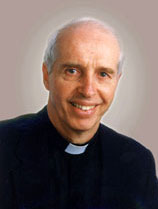
First Reading and Psalm
Leviticus 13:1-2, 44-46
Psalm 32:1bb-2, 5, 11
The Second Reading, 1 Corinthians 10:31; 11:1
The Gospel, Mark 1:40-45
Tags: catholic, catholic podcast, catholic prayer, cathollc spirituality, Fr. Francis Martin, Francis Martin, gospel of mark, Psalm Leviticus
This entry was posted on Saturday, February 11th, 2012 at 7:50 am
You can follow any responses to this entry through the RSS 2.0 feed.

First Reading and Psalm
Job 7:1-4, 6-7
Psalm 147:1-2, 3-4, 5-6
Second Reading, 1 Corinthians 9:16-19, 22-23
The Gospel, Mark 1:29-39
Tags: catholic, catholic podcast, catholic prayer, cathollc spirituality, gospel of mark
This entry was posted on Friday, February 3rd, 2012 at 7:29 am
You can follow any responses to this entry through the RSS 2.0 feed.

First Reading and the Psalm
Deuteronomy 18:15-20
Psalm 95:1-2, 6-7, 8-9
Second Reading, 1 Corinthians 7:32-35
The Gospel, Mark 1:21-28
Tags: catholic, catholic podcast, catholic prayer, cathollc spirituality, Fr. Francis Martin, gospel of mark
This entry was posted on Friday, January 27th, 2012 at 6:51 am
You can follow any responses to this entry through the RSS 2.0 feed.
“Herod feared John, knowing that he was a righteous and holy man”
[powerpress=”daily-scripture”]
an excerpt from today’s reflection by Don Schwager:
Are you prepared to be a witness, and if necessary, a martyr for Jesus Christ? John the Baptist bridged the Old and New Testaments. He is the last of the Old Testament prophets who pointed the way to the Messiah. He is the first of the New Testament witnesses and martyrs. Jesus equated the coming of his kingdom with violence. From the days of John the Baptist until now the kingdom of heaven has suffered violence, and men of violence take it by force (Matthew 11:12). John suffered violence for announcing that the kingdom of God was near. He was thrown into prison and then beheaded. Why did Herod put John to death when he knew him to be a righteous and holy man? Herod was a weak ruler. He could take a strong stand on the wrong things when he knew the right. Such a stand, however, was a sign of weakness and cowardice. Unfortunately for Herod, he could not rid himself of sin by ridding himself of the man who confronted him with his sin.
Since John’s martyrdom to the present times the kingdom of heaven has suffered violence and persecution at the hands of violent people. The blood of Christian martyrs throughout the ages bear witness to this fact. Their testimony to the truth of the gospel and their willingness to suffer and die for their faith prove victory rather than defeat for the kingdom of God. Through Christ’s victory on the cross they obtain the glorious crown of victory and everlasting life with Jesus Christ. What gives us the power, boldness, and courage to witness to Jesus Christ and to the truth of the gospel? The Holy Spirit fills us with courage, love, and boldness to make Jesus Christ known and loved. We do not need to fear those who oppose the gospel, because the love of Jesus Christ is stronger than fear and death itself. His love conquers all, even our fears and timidity in the face of opposition and persecution. We can trust in his grace and help at all times. Are you ready to make Christ known and loved, and if necessary to suffer for his sake and the sake of the gospel?
“Lord Jesus Christ, give me faith, boldness, and courage to stand firm in the truth of the gospel and to not waver in my testimony of your love and grace. Give me hope and joy in the promise of everlasting life with you in your kingdom.”
for the full reflection visit : Daily Reading and Meditation
Tags: beheading of john the baptist, catholic, catholic podcast, catholic prayer, cathollc spirituality, don schwager, gospel of mark, john the baptist, martyrdom
This entry was posted on Monday, August 29th, 2011 at 6:43 am
You can follow any responses to this entry through the RSS 2.0 feed.
The Ninth Monday in Ordinary Time – from the Gospel of Mark the full reading and reflection
“They will respect my beloved Son”
an excerpt from today’s reflection by Don Schwager: 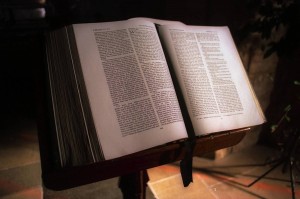
This parable speaks to us today as well. It richly conveys some important truths about God and the way he deals with his people. First, it tells us of God’s generosity and trust. The vineyard is well equipped with everything the tenants need. The owner went away and left the vineyard in the hands of the tenants. God, likewise trusts us enough to give us freedom to run life as we choose. This parable also tells us of God’s patience and justice. Not once, but many times he forgives the tenants their debts. But while the tenants take advantage of the owner’s patience, his judgment and justice prevail in the end. Jesus foretold both his death and his ultimate triumph. He knew he would be rejected and be killed, but he also knew that would not be the end. After rejection would come glory – the glory of resurrection and ascension to the right hand of the Father. How do we share in this glory? By submitting to Jesus’ kingly rule in our lives. Jesus promises that we will bear much fruit (certainly the fruit of peace, righteousness, and joy, and much more besides) if we abide in him (see John 15:1-11). The Lord also entrusts his gifts to each of us and he gives us work to do in his vineyard – the body of Christ. He promises that our labor will not be in vain if we persevere with faith to the end (see 1 Corinthians 15:58). We can expect trials and even persecution. But in the end we will see triumph. Do you labor for the Lord with joyful hope and with confidence in his triumph?
“Thank you, Lord Jesus Christ, for all the benefits which you have given us; for all the pains and insults which you have borne for us. O most merciful redeemer, friend, and brother, may we know you more clearly, love you more dearly, and follow you more nearly, for your own sake!” (Prayer of St. Richard of Chichester, 13th century)
for the full reflection visit : Daily Reading and Meditation
Tags: catholic, catholic podcast, catholic prayer, cathollc spirituality, don schwager, gospel of mark
This entry was posted on Monday, March 7th, 2011 at 12:03 am
You can follow any responses to this entry through the RSS 2.0 feed.
The Eighth Saturday in Ordinary Time – from the Gospel of Mark the full reading and reflection
“By what authority are you doing these things?”
an excerpt from today’s reflection by Don Schwager: 
Do you accept the authority of God’s word and submit to it with trust and obedience? Many religious leaders took offense at Jesus because they could not accept his authority. After Jesus had dramatically cleansed the temple of the traders and money-changers the Jewish leaders question Jesus to trap him. If he says his authority is divine they will charge him with blasphemy. If he has done this on his own authority they might well arrest him as a mad zealot before he could do more damage. Jesus, seeing through their trap, poses a question to them and makes their answer a condition for his answer. Did they accept the work of John the Baptist as divine or human? If they accepted John’s work as divine, they would be compelled to accept Jesus as the Messiah. They dodged the question because they were unwilling to face the truth. They did not accept the Baptist and they would not accept Jesus as their Messiah. Jesus told his disciples that “the truth will make you free†(John 8:31). Do you know the joy and freedom of living according to God’s word of truth?
“Lord Jesus, your word is life and truth. Instruct my heart that I may grow in the knowledge of your truth and live according to your wordâ€.
for the full reflection visit : Daily Reading and Meditation
Tags: catholic, catholic podcast, catholic prayer, cathollc spirituality, don schwager, gospel of mark
This entry was posted on Saturday, March 5th, 2011 at 8:01 am
You can follow any responses to this entry through the RSS 2.0 feed.
The Eighth Friday in Ordinary Time – from the Gospel of Mark the full reading and reflection
“My house shall be called a house of prayer for all the nations”
an excerpt from today’s reflection by Don Schwager: 
Jesus’ cleansing of the temple was another prophetic action. In this incident we see Jesus’ startling and swift action in cleansing the temple of those who were using it to exploit the worshipers of God. The money changers took advantage of the poor and forced them to pay many times more than was right– in the house of the Lord no less! Their robbery of the poor was not only dishonoring to God but 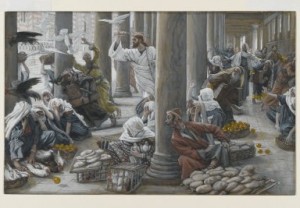 unjust toward their neighbor. In justification for his audacious action Jesus quotes from the prophets Isaiah (56:7) and Jeremiah (7:11). His act of judgment aims to purify the worship of God’s people and to discipline their erring ways.
unjust toward their neighbor. In justification for his audacious action Jesus quotes from the prophets Isaiah (56:7) and Jeremiah (7:11). His act of judgment aims to purify the worship of God’s people and to discipline their erring ways.
After this incident Jesus exhorts his disciples to “have faith in Godâ€. They are to pray with expectant faith no matter how difficult the situation may be. The phrase “to remove mountains†was a common Jewish expression for removing difficulties. A wise teacher who could solve difficulties was called a “mountain removerâ€. If we pray with faith God will give us the means to overcome difficulties and obstacles. If we want God to hear our prayers we must forgive those who wrong us as God has forgiven us. Do you pray with expectant faith?
“Lord Jesus, increase my faith and make me fruitful and effective in serving you. Help me to forgive others just as you have been merciful towards me”
for the full reflection visit : Daily Reading and Meditation
Tags: catholic, catholic podcast, catholic prayer, cathollc spirituality, don schwager, gospel of mark
This entry was posted on Friday, March 4th, 2011 at 8:27 am
You can follow any responses to this entry through the RSS 2.0 feed.
The Eighth Thursday in Ordinary Time – from the Gospel of Mark the full reading and reflection
“What do you want me to do for you?”
an excerpt from today’s reflection by Don Schwager: 
Have you ever encountered a once in a life-time opportunity you knew you could not pass up? Such a moment came for a blind and destitute man, named Bartimaeus. He was determined to get near the one person who could meet his need. He knew who Jesus was and had heard of his fame for healing, but until now had no means of making contact with the Son of David, a clear reference and title for the Messiah. It took a lot of “guts” and persistence for Bartimaeus to get the attention of Jesus over the din of a noisy throng who crowded around Jesus as he made his way out of town. Why was the crowd annoyed with the blind man’s persistent shouts? He was disturbing their peace and interrupting Jesus’ discourse. It was common for a rabbi to teach as he walked with others. Jesus was on his way to celebrate the Passover in Jerusalem and a band of pilgrims followed him. When the crowd tried to silence the blind man he overpowered them with his emotional outburst and thus caught the attention of Jesus.
This incident reveals something important about how God interacts with us. The blind man was determined to get Jesus’ attention and he was persistent in the face of opposition. Jesus could have ignored or rebuffed him because he was disturbing his talk and his audience. Jesus showed that acting was more important than talking. This man was in desperate need and Jesus was ready, not only to empathize with his suffering, but to relieve it as well. A great speaker can command attention and respect, but a man or woman with a helping hand and a big heart is loved more. Jesus commends Bartimaeus for recognizing who he is with the eyes of faith and grants him physical sight as well. Do you recognize your need for God’s healing grace and do you seek Jesus out, like Bartimaeus, with persistent faith and trust in his goodness and mercy?
“Lord Jesus, may I never fail to recognize my need for your grace. Help me to take advantage of the opportunities you give me to seek your presence daily and to listen attentively to your word.”
for the full reflection visit : Daily Reading and Meditation
Tags: catholic, catholic podcast, catholic prayer, cathollc spirituality, don schwager, gospel of mark
This entry was posted on Thursday, March 3rd, 2011 at 12:33 am
You can follow any responses to this entry through the RSS 2.0 feed.
The Eighth Wednesday in Ordinary Time – from the Gospel of Mark the full reading and reflection
“We have left everything and followed you”
an excerpt from today’s reflection by Don Schwager: 
Was Jesus a pessimist or a stark realist? On three different occasions the Gospels record that Jesus predicted he would endure great suffering through betrayal, rejection, and the punishment of a cruel death. The Jews resorted to stoning and the Romans to crucifixion – the most painful and humiliating death they could devise for criminals they wanted to eliminate. No wonder the apostles were greatly distressed at such a prediction! If Jesus their Master were put to death, then they would likely receive the same treatment by their enemies. Jesus called himself the “Son of Man†because this was a common Jewish title for the Messiah. Why must the Messiah be rejected and killed? Did not God promise that his Anointed One would deliver his people from their oppression and establish a kingdom of peace and justice? The prophet Isaiah had foretold that it was God’s will that the “Suffering Servant†make atonement for sins through his suffering and death (Isaiah 53:5-12). Jesus paid the price for our redemption with his blood. Slavery to sin is to want the wrong things and to be in bondage to destructive desires. The ransom Jesus paid sets us free from the worst tyranny possible – the tyranny of sin and the fear of death. Jesus’ victory did not end with death but triumphed over the tomb. Jesus defeated the powers of death through his resurrection. Do you want the greatest freedom possible, the freedom to live as God truly meant us to live as his sons and daughters?
Jesus did the unthinkable! He wedded authority with selfless service and with loving sacrifice. Authority without sacrificial love is brutish and self-serving. Jesus also used stark language to explain what kind of sacrifice he had in mind. His disciples must drink his cup if they expect to reign with him in his kingdom. The cup he had in mind was a bitter one involving crucifixion. What kind of cup does the Lord have in mind for us? For some disciples such a cup entails physical suffering and the painful struggle of martyrdom. But for many, it entails the long routine of the Christian life, with all its daily sacrifices, disappointments, set-backs, struggles, and temptations. A disciple must be ready to lay down his or her life in martyrdom and be ready to lay it down each and every day in the little and big sacrifices required. An early church father summed up Jesus’ teaching with the expression: to serve is to reign with Christ. We share in God’s reign by laying down our lives in humble service as Jesus did for our sake. Are you willing to lay down your life and to serve others as Jesus did?
“Lord Jesus, your death brought life and freedom. Make me a servant of your love, that I may seek to serve rather than be served.â€
for the full reflection visit : Daily Reading and Meditation
Tags: catholic, catholic podcast, catholic prayer, cathollc spirituality, don schwager, gospel of mark
This entry was posted on Wednesday, March 2nd, 2011 at 6:16 am
You can follow any responses to this entry through the RSS 2.0 feed.
The Eighth Tuesday in Ordinary Time – from the Gospel of Mark the full reading and reflection
“We have left everything and followed you”
an excerpt from today’s reflection by Don Schwager: 
Right after a wealthy young man refused to follow Jesus, Peter, somewhat crudely wanted to know what he and the other disciples would get out of it since they had freely accepted Jesus’offer to follow him unconditionally. Jesus spoke with utter honesty: Those who left all for him would receive a hundred times more now, even in this life, as well as unending life in the age to come. Jesus’disciples can expect opposition and persecution from those who are opposed to Christ and his gospel.
Should we be surprised if we lose favor and experience ridicule, intimidation, and injury when we take a stand for truth and righteousness? In place of material wealth, Jesus promised his disciples the blessing and joy of rich fellowship with the community of believers. No earthly good or possession can rival the joy and bliss of knowing God and the peace and unity he grants to his disciples. The Lord wants to fill our hearts with the vision of heaven and with his joy and peace. Do you know the joy of following the Lord as his disciple? Ask the Holy Spirit to fill you with the joy of the gospel and the knowledge of God’s personal love.
“Lord Jesus, I want to follow you as your disciple and to love you wholeheartedly with all that I have. Fill my heart with faith, hope, and love that I may always find peace and joy in your presence.”
for the full reflection visit : Daily Reading and Meditation
Tags: catholic, catholic podcast, catholic prayer, cathollc spirituality, don schwager, gospel of mark
This entry was posted on Tuesday, March 1st, 2011 at 5:24 am
You can follow any responses to this entry through the RSS 2.0 feed.
The Eighth Monday in Ordinary Time – from the Gospel of Mark the full reading and reflection
“Whoever does not receive the kingdom of God like a child shall not enter it”
an excerpt from today’s reflection by Don Schwager: 
Those who are generous towards God and towards their neighbor find that they cannot outgive God in his generosity towards us. God blesses us with the priceless treasures of his kingdom – freedom from fear and the griping power of sin, selfishness and pride which block his love and grace in our lives; freedom from loneliness, isolation and rejection which keep his children from living together in love, peace, and unity; and freedom from hopelessness, despair, and disillusionment which blind our vision of God’s power to heal every hurt, bind every wound, and remove every blemish which mar the image of God within us. God offers us treasure which money cannot buy. He alone can truly satisfy the deepest longing and desires of our heart. Are you willing to part with anything that might keep you from seeking true joy with Jesus?
Why does Jesus issue such a strong warning to the rich (as well as to the rest of us who desire to be rich)? Was he really against wealth? We know that Jesus was not opposed to wealth per se, nor was he opposed to the wealthy. He had many friends who were well-to-do, 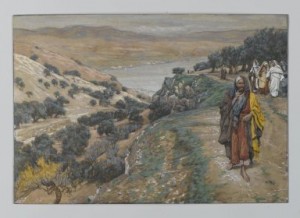 including some notorious tax collectors! One even became an apostle! Jesus’ warning reiterated the teaching of the Old Testament wisdom: Better is a poor man who walks in his integrity than a rich man who is perverse in his ways (Proverbs 28:6; see also Psalm 37:16). Do not wear yourself out to get rich; be wise enough to desist (Proverbs 23:4). Jesus seems to say that it is nearly impossible for the rich to live as citizens of God’s kingdom. The camel was regarded as the largest animal in Palestine. The “eye of the needle” could be interpreted quite literally or it could figuratively describe the narow and low gate of the city walls which was used by travellers when the larger public gate was locked after dark. A normal sized man had to “lower” himself to enter that gate. A camel would literally have to knell and crawl through it. Why is Jesus so cautious about wealth? Wealth can make us falsely independent. The church at Laodicea was warned about their attitude towards wealth and a false sense of security: “For you say, I am rich, I have prospered, and I need nothing” (Revelations 3:17). Wealth can also lead us into hurtful desires and selfishness (see 1 Timothy 6:9-10). Look at the lesson Jesus gave about the rich man and his sons who refused to aid the poor man Lazarus (see Luke 16:19ff). They also neglected to serve God. The scriptures give us a paradox: we lose what we keep and we gain what we give away. Generosity will be amply repaid, both in this life and in eternity (Proverbs 3:9-10, Luke 6:38). Jesus offers us an incomparable treasure which no money can buy and no thief can steal. The thing we most set our heart on is our highest treasure. Material wealth will shackle us to this earth unless we guard our hearts and set our treasure on God and his everlasting kingdom. Where is your treasure?
including some notorious tax collectors! One even became an apostle! Jesus’ warning reiterated the teaching of the Old Testament wisdom: Better is a poor man who walks in his integrity than a rich man who is perverse in his ways (Proverbs 28:6; see also Psalm 37:16). Do not wear yourself out to get rich; be wise enough to desist (Proverbs 23:4). Jesus seems to say that it is nearly impossible for the rich to live as citizens of God’s kingdom. The camel was regarded as the largest animal in Palestine. The “eye of the needle” could be interpreted quite literally or it could figuratively describe the narow and low gate of the city walls which was used by travellers when the larger public gate was locked after dark. A normal sized man had to “lower” himself to enter that gate. A camel would literally have to knell and crawl through it. Why is Jesus so cautious about wealth? Wealth can make us falsely independent. The church at Laodicea was warned about their attitude towards wealth and a false sense of security: “For you say, I am rich, I have prospered, and I need nothing” (Revelations 3:17). Wealth can also lead us into hurtful desires and selfishness (see 1 Timothy 6:9-10). Look at the lesson Jesus gave about the rich man and his sons who refused to aid the poor man Lazarus (see Luke 16:19ff). They also neglected to serve God. The scriptures give us a paradox: we lose what we keep and we gain what we give away. Generosity will be amply repaid, both in this life and in eternity (Proverbs 3:9-10, Luke 6:38). Jesus offers us an incomparable treasure which no money can buy and no thief can steal. The thing we most set our heart on is our highest treasure. Material wealth will shackle us to this earth unless we guard our hearts and set our treasure on God and his everlasting kingdom. Where is your treasure?
“Lord Jesus, you have captured our hearts and opened to us the treasures of heaven. May you always be my treasure and delight and may nothing else keep me from giving you my all.”
for the full reflection visit : Daily Reading and Meditation
Tags: catholic, catholic podcast, catholic prayer, cathollc spirituality, don schwager, eye of the needle, gospel of mark
This entry was posted on Monday, February 28th, 2011 at 7:59 am
You can follow any responses to this entry through the RSS 2.0 feed.


